|
|
|
Sort Order |
|
|
|
Items / Page
|
|
|
|
|
|
|
| Srl | Item |
| 1 |
ID:
144096
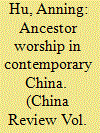

|
|
|
|
|
| Summary/Abstract |
Although ancestor worship has been widely acknowledged as one of the most significant cultural traditions in Chinese society, information about its nationwide popularity and followers’ sociodemographic characteristics is still not clear. Taking advantage of the first nationwide survey on Chinese residents’ spiritual life, this study examines: (1) the extent of popularity of typical ancestor worship practices, (2) the sociodemographic features of ancestor worship individuals, and (3) the “magical” elements of ancestor worship activities. Empirical results suggest that, first, the most popular ancestor worship practices in contemporary China are venerating the spirits of ancestors or deceased relatives and visiting the gravesite of ancestors. Ancestor worship practice participants make up over 70 percent of the adult population. Second, on average, males are more active in ancestor worship than females. Also, economic status is positively associated with ancestor worship participation. Nevertheless, urbanization and migration have a negative effect on people’s propensity of practicing ancestor worship. Third, the magical aspect of ancestor worship is less attractive to well-educated adults, but more likely to be followed by senior individuals.
|
|
|
|
|
|
|
|
|
|
|
|
|
|
|
|
| 2 |
ID:
144095


|
|
|
|
|
| Summary/Abstract |
This article draws on survey and interview data in Beijing and Guangzhou to examine the attributes, political attitudes, and political actions of homeowner activist leaders. Homeowner activist leaders are not agents of broad democratization. Instead, they are found to be supportive of Communist Party rule and value societal stability. In addition, homeowner activist leaders act like interest groups and actively seek to influence both national and local policy making. They also actively engage in expanding networks among homeowner activists and establishing forums to exchange experiences in homeowner activism. The political attitudes of homeowner activist leaders differ across localities. Compared to those in Beijing, Guangzhou homeowner activist leaders are more satisfied with government performance.
|
|
|
|
|
|
|
|
|
|
|
|
|
|
|
|
| 3 |
ID:
144094
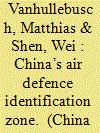

|
|
|
|
|
| Summary/Abstract |
China’s establishment of its Air Defence Identification Zone (ADIZ) is yet another manifestation on the strenuous development of regional security in East Asia. China by virtue of its so-called lawfare has instrumentalized international air law, the law of the sea, and law on the use force to reinforce its comprehensive security doctrine both on the military as well as economic front. Accordingly, China has advanced is sovereign interests through each of these branches of international law when extending its domestic laws in airspace above its Exclusive Economic Zone (EEZ), affirming its sovereignty over the disputed islands and being prepared to respond to imminent threats. Conversely, opponents of the zone have equally exploited those normative frameworks to defend their geopolitical and strategic interests in East Asia under the veil of the communitarian freedoms of overflight.
|
|
|
|
|
|
|
|
|
|
|
|
|
|
|
|
| 4 |
ID:
144091
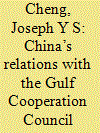

|
|
|
|
|
| Summary/Abstract |
This article examines China’s relations with the Gulf Cooperation Council states. China’s interests in the Gulf region have been evolving; and in the 21st century they cover geopolitical interests, economic and trade interests, energy security interests, and nontraditional security interests. China’s approach is multilevel: it maintains diplomatic relations with individual GCC states; it has initiated formal mechanisms of regular regional forums; it engages in people-to-people diplomacy through student exchanges and the setting up of Confucius Institutes in various GCC states; it maintains dialogues with other major powers; and it participates in important multilateral conferences on regional affairs. This article assesses China’s performance in this multilevel diplomacy that demands close coordination between the various levels of foreign policy making and policy implementation, and the maintenance of a delicate balance in the complex major power competition and regional rivalries in a divided Arab world. In line with China’s Arab-world experts who often examine the strategic configuration in the Gulf region within a framework of five periods, China’s Gulf policy is analyzed in the following stages: (1) 1958–1967, (2) 1967–1971, (3) 1971–1979, (4) 1979–1990, (5) 1990–2001, and (6) 2001–present. Major emphasis is placed on developments in recent years.
|
|
|
|
|
|
|
|
|
|
|
|
|
|
|
|
| 5 |
ID:
144093
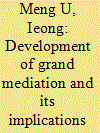

|
|
|
|
|
| Summary/Abstract |
Grand Mediation (GM) is a new conflict management mechanism initiated by the Chinese Communist Party (CCP) to cope with rapidly growing social conflicts and maintain social stability. This article examines how GM operates in an urban grassroots environment and discusses its advantages for managing social conflicts as reflected in a cases study: the Li Qin mediation office. It concludes that GM may improve the capacity of the local government to engage in conflict resolutions, which confers greater resilience on the authoritarian regime. However, this mechanism is sensitive to changing socioeconomic conditions, and its sustainability requires further examination.
|
|
|
|
|
|
|
|
|
|
|
|
|
|
|
|
| 6 |
ID:
144092


|
|
|
|
|
| Summary/Abstract |
In 2005, in response to growing concern about the exposure of cases of wrongful conviction in China, the Institute of Evidence in the Law School of Renmin University embarked upon an “Empirical Study of Wrongful Convictions” that collected over 100 cases of wrongful conviction exposed by the media, analyzed representative cases and survey data, and held panel discussions to review research. It found that wrongful convictions are generally the result of several interconnected factors, mainly in the investigation stage of criminal proceedings. These factors include the “from confession to evidence” model of criminal investigation, the setting of inappropriately tight deadlines for solving criminal cases, the prejudicial collection of evidence, the misinterpretation of scientific evidence, and the continued use of torture to extract confessions. Acknowledging and avoiding such practices is a crucial step toward preventing wrongful convictions in China.
|
|
|
|
|
|
|
|
|
|
|
|
|
|
|
|
| 7 |
ID:
144090
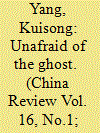

|
|
|
|
|
| Summary/Abstract |
This article examines the origin of the two Taiwan Strait crises in 1954–1955 and 1958. Whereas the previous literature has focused on how domestic and international factors led to the shelling of Jinmen, this study investigates the effects of Mao’s victim mentality. Like many other intellectuals in the late Qing and Republican eras, Mao was deeply disturbed by the Chinese “century of humiliation,” a historical narrative emphasizing foreign intervention and imperialist aggression. Such feelings of humiliation and victimization were reinforced when the American fleet blocked Mao’s plan to reunify China in the 1950s. It is argued that Mao’s victim mentality was a significant factor contributing to his decision to shell Jinmen twice. By analyzing this case, this article reveals the emotional side of the PRC diplomacy.
|
|
|
|
|
|
|
|
|
|
|
|
|
|
|
|
|
|
|
|
|